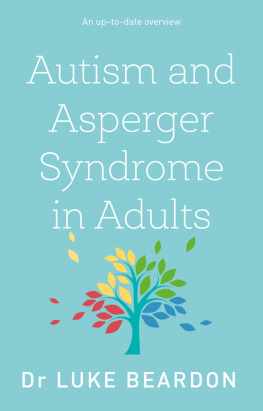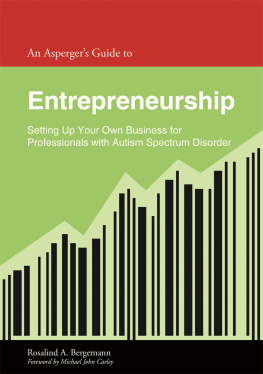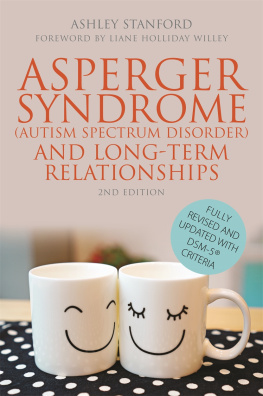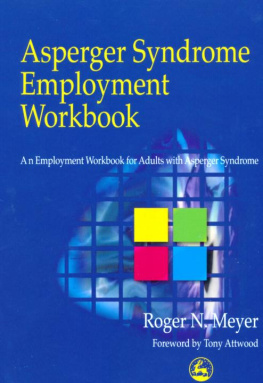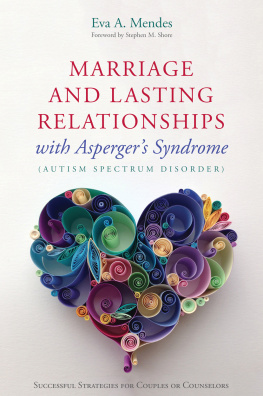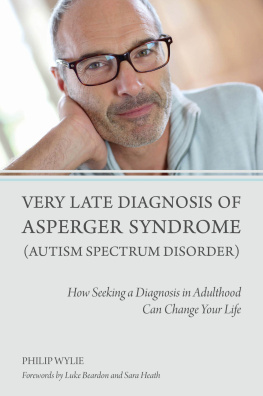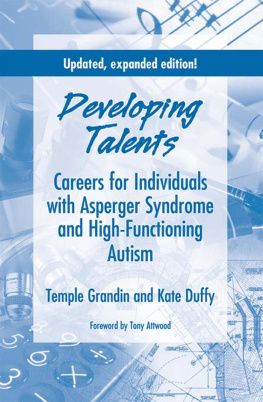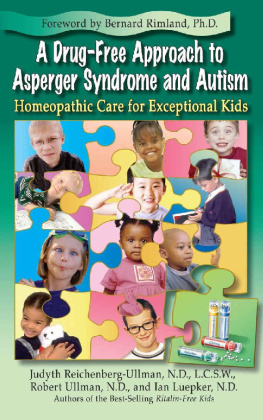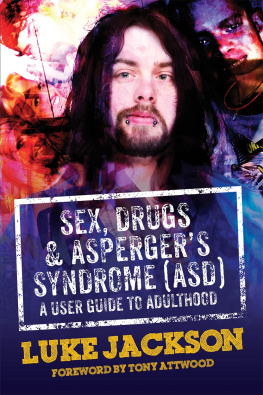
Autism and Asperger Syndrome in Adults
Dr Luke Beardon has worked for decades in a wide range of roles in the field of autism, and has won many autism-related awards. He describes his interests as anything relating to autism and has a passion for the rights and equalities of autistic children and adults. His current role is Senior Lecturer in Autism at The Autism Centre which is part of Sheffield Hallam Universitys Institute of Education.
Overcoming Common Problems Series
Selected titles
A full list of titles is available from Sheldon Press,
36 Causton Street, London SW1P 4ST and on our website at
www.sheldonpress.co.uk
Beating Insomnia: Without really trying
Dr Tim Cantopher
Chronic Fatigue Syndrome: What you need to know about CFS/ME
Dr Megan A. Arroll
Cider Vinegar
Margaret Hills
Coeliac Disease: What you need to know
Alex Gazzola
Coping Successfully with Hiatus Hernia
Dr Tom Smith
Coping with a Mental Health Crisis: Seve n steps to healing
Catherine G. Lucas
Coping with Difficult Families
Dr Jane McGregor and Tim McGregor
Coping with Endometriosis
Jill Eckersley and Dr Zara Aziz
Coping with Memory Problems
Dr Sallie Baxendale
Coping with Schizophrenia
Professor Kevin Gournay and Debbie Robson
Coping with the Psychological Effects of Illness
Dr Fran Smith, Dr Carina Eriksen and Professor Robert Bor
Coping with Thyroid Disease
Mark Greener
Depression and Anxiety the Drug-Free Way
Mark Greener
Depressive Illness: The curse of the strong
Dr Tim Cantopher
Dr Dawns Guide to Brain Health
Dr Dawn Harper
Dr Dawns Guide to Digestive Health
Dr Dawn Harper
Dr Dawns Guide to Healthy Eating for Diabetes
Dr Dawn Harper
Dr Dawns Guide to Healthy Eating for IBS
Dr Dawn Harper
Dr Dawns Guide to Heart Health
Dr Dawn Harper
Dr Dawns Guide to Sexual Health
Dr Dawn Harper
Dr Dawns Guide to Weight and Diabetes
Dr Dawn Harper
Dr Dawns Guide to Womens Health
Dr Dawn Harper
The Fibromyalgia Healing Diet
Christine Craggs-Hinton
Helping Elderly Relatives
Jill Eckersley
How to Stop Worrying
Dr Frank Tallis
Invisible Illness: Coping with misunderstood conditions
Dr Megan A. Arroll and Profess or Christin e P. Dancey
Living with Fibromyalgia
Christine Craggs-Hinton
Living with Hearing Loss
Dr Don McFerran, Lucy Handscomb and Dr Cherilee Rutherford
Living with the Challenges of Dementia: A guide for family and friends
Patrick McCurry
Overcoming Emotional Abuse: Survive and heal
Susan Elliot-Wright
Overcoming Low Self-esteem with Mindfulness
Deborah Ward
Overcoming Worry and Anxiety
Dr Jerry Kennard
Post-Traumatic Stress Disorder: Recovery after accident and disaster
Professor Kevin Gournay
The Stroke Survival Guide
Mark Greener
Ten Steps to Positive Living
Dr Windy Dryden
Treating Arthritis: The drug-free way
Margaret Hills and Christine Horner
Understanding High Blood Pressure
Dr Shahid Aziz and Dr Zara Aziz
Understanding Yourself and Others: Practical ideas from the world of coaching
Bob Thomson
When Someone You Love Has Dementia
Susan Elliot-Wright
The Whole Person Recovery Handbook
Emma Drew
Overcoming Common Problems
Autism and Asperger
Syndrome in Adults
DR LUKE BEARDON

First published in Great Britain in 2017
Sheldon Press
36 Causton Street
London SW1P 4ST
www.sheldonpress.co.uk
Copyright Dr Luke Beardon 2017
All rights reserved. No part of this book may be reproduced or transmitted in any form or by any means, electronic or mechanical, including photocopying, recording, or by any information storage and retrieval system, without permission in writing from the publisher.
Index created by Dr Nick Chown
British Library Cataloguing-in-Publication Data
A catalogue record for this book is available from the British Library
ISBN 9781847094451
eBook ISBN 9781847094469
eBook by Fakenham Prepress Solutions, Fakenham, Norfolk NR21 8NN
To all the autistic people and their families
who have shared their lives with me; youre the real teachers.
And, as always, to my own family without you, I am nothing
There is a plethora of individuals to whom I owe a debt of gratitude, for varying reasons that need not be aired in public. I hope you know what you mean to me. In no particular order: Dr Nick Chown, Dr Sandra Beale-Ellis (and Joe), Julia Leatherland and family, my trimigo Piggy-Paws (and husband), Dr Linda Buchan and the Axia family, including Dream, Dean Beadle, Sarah Hendrickx, Kleio Cossburn and Caroline Lear. Last but never least, Ash my ongoing dose of reality.
The first part of the section on Social anxiety in is an expanded version of my blog post Mustnt Grumble.
Never believe anything you read about autism.
Perhaps this statement requires some justification. After all, if you have bought this book you may well be somewhat disappointed at such an opening remark; if you are in a shop trying to decide whether to buy it or not, then it may well put you off!
There is no such thing as a typical autistic person. There is extraordinarily little that can be said to be true or valid when pertaining to the whole of the population described as autistic. There is no one size fits all approach, nor any description of an autistic person that will be true for all individuals. There are very few facts about autism that are common to all individuals, and precious little advice that can be beneficial to all families, individuals, parents or professionals. Thus, everything you read or hear about autism, see on the TV, etc., must be taken with a very clear understanding that it may not be particularly relevant to you. The heterogeneity of the autistic population is such that there will be differences from one individual to the next, and what is of huge relevance to one party may have no meaning whatsoever to another. It is hugely frustrating to read suggestions that the best thing for children with autism is... or any similar definitive sentiment. What may work well for one individual could be a disaster for another. Taking this a stage further, what may work well for one individual one day could be a disaster for the same individual the next day. Such is the nature of autism.
By far the best approach (in my opinion) is that of unadulterated honesty. There will be nothing written in this book that I do not honestly believe; there may be some matters that I deliberately leave open ended, if there is no clear answer. To constantly question the validity of what is being written, and the theories and perspectives that can be found out there, is good practice. But to digest the written word without question, and then to make the assumption that all that has been digested will be of relevance to your situation, goes against the principles of this book, and I would urge you not to take that route.
Let me say a bit about the perspective from which Im writing. My understanding of autism has come about from decades of working in autism-related fields. I have been a support worker, an outreach worker, a service co-ordinator, a project officer, a development officer, an autism consultant, a trainer, a researcher and a lecturer all within the autism field. I am lucky enough to have chatted at length about autism with hundreds of individuals on what is often known as the spectrum, as well as parents, carers, professionals and academics. I also have several personal connections within the field. My writing therefore stems from an amalgamation of experience, learning from others, research and almost constant rumination; I do not claim to be an expert on the subject, and anyone who does is misguided (one may have a high level of expertise in the field but that does not mean one is an expert in all things related to autism). I do hope, though, that what I have written here will stimulate thought and be of help.
Next page
